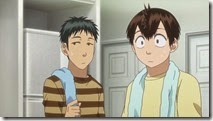 |
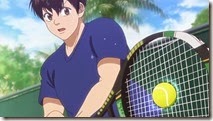 |
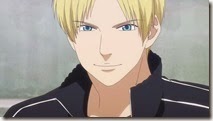 |
You’ve heard me say it before, but the title of this series is definitely truth in advertising.
Baby Steps being awesome is like the sun rising in the East – you just know you can count it every time. The only downside as a writer, really, is that this is one of those shows that doesn’t require a whole lot of embellishment or help of any kind – it does such a good job of telling its story that very little is required in terms of interpretation. I think that’s even more true now that new viewers are far enough into the meat of the story to be caught up in Ei-chan’s quest, and his daily struggles to get better. If I had a dollar for every time I heard the “too slow!” complaint about the early chapters or episodes, I could have a very nice dinner somewhere – but I think it’s clear now that not a moment of that was unnecessary. Baby Steps isn’t the kind of series that skips steps.
While there are obviously a lot of new fans of sports anime now that aren’t necessarily big sports fans, for those of us that are I think there are two kinds of experiences in watching/reading sports series. There’s the awakening of interest in a sport about which one has little prior interest and/or knowledge, which I had with the likes of Chihayafuru and Capeta. And then there’s the wonderful experience of seeing your passions and experiences portrayed brilliantly when it’s a sport you know well, which has happened for me many times – but never more than with Baby Steps. Part of it is that I actually played the sport competitively (though not especially well) but more important is that this series is simply so exquisite at getting the details right.
Maruo’s personal journey is one track – the exploration of the sport of tennis another. They intersect often in Baby Steps, and this is one of those episodes where the game itself is the star. I love the details of Mike’s explanation to Maruo about how the attacking style of modern tennis is different from what he’s used to in Japan, in which Mike explains how the professional game has evolved over the past two decades. We no longer have a sport of predominantly counter-attacking baseliners who dominate on clay and serve-and-volleyers who dominate on grass, and the meeting in the middle on hard courts – the modern sport is largely about men who attack from the baseline. There are still a few “pushers” out there, mostly clayfoots from Europe and South America, but the true serve-and-volley player is almost extinct. Mike explains why perfectly – it’s a question of modern fitness, modern equipment and playing the percentages. Whatever you think of the aesthetics of this change, it’s a part of tennis now and for the foreseeable future.
This is the point at which we see Ei-chan’s journey of self-discovery intersect with the tennis path, because he’s still so new to this game. He still has to decide what kind of player he is, and while he’s discovering what dominates in the rest of the world, Ei-chan has enough self-awareness – and determination – to realize that he needs to find a style that suits him. When Mike tells him he needs to work on power and speed, Ei-chan doesn’t deny it – it’s obvious. But he also insists that he should build around an area where he already feels confident – control. And in doing so, admits that his current level of control isn’t sufficient to be a weapon against the caliber of players he’s facing in Florida.
Fortunately the staff at Bollettieri Florida Tennis Academy are flexible (and open-minded) enough to help Ei-chan with this novel approach rather than force a “house style” down his throat (which happens with many youth tennis programs). This is by no means the path of least resistance Ei-chan has chosen – but the path he chooses never is. Still, the worst thing one can do in a competition is over-think, and Ei-chan loses 27 straight matches s he’s focused on technique rather than winning – or the opponent. One of his coaches points out that he can’t win looking at his racket when he hits – he needs to be looking at the opponent – but even that’s not enough.
One of the painful contradictions of learning a sport (or a game like chess) is that the best way to improve quickly is to lose to better players. Yet losing over and over becomes a vicious cycle – the more you lose the more desperate you are to win, and the more desperate you are to win the more you try too hard in key moments. Even for the best pros, the mental approach in pivotal situations is arguably the most important aspect of the game. Fortunately for Maruo he’s belligerent, and one of the great things Katsuki-sensei develops in this story is the competitive but ultimate supportive fraternity among the rivals in Ei-chan’s age bracket. That extends to Florida too, where Alex gives him some familiar-sounding advice (in Engrish) – “believe in yourself”. As the losses and pressure pile up, so does the desire on the part of Ei-chan’s friends and coaches to see him break through.
Which you know he’ll do eventually, of course. The key is a bit of a fluke – a trip on an untied shoelace that knocks Ei-chan out of his uptight haze and imprints on him the importance of having a set routine before every point. It’s not magic – the match against his rival Pedro doesn’t turn immediately. But this is no mere plot device – it isn’t just tennis where we see this kind of meditative ritual prove vital to helping a player relax and allow themselves to move freely. As with everything in this series, this discovery by Ei-chan isn’t the destination – it’s the starting line, another aspect of his own psyche for him to explore and understand.
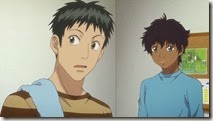 |
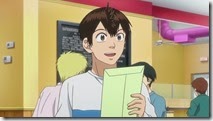 |
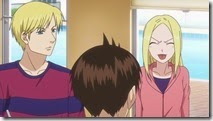 |
 |
 |
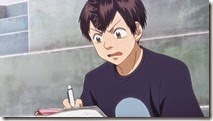 |
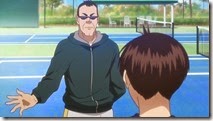 |
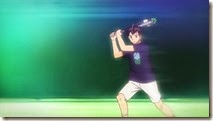 |
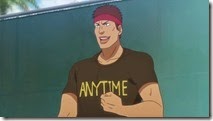 |
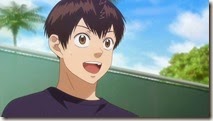 |
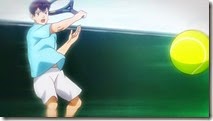 |
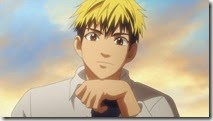 |
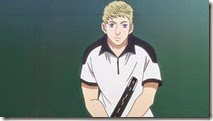 |
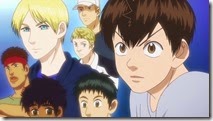 |
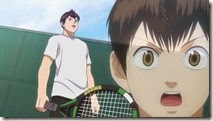 |
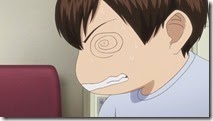 |
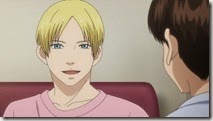 |
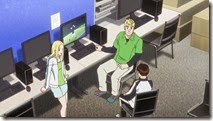 |
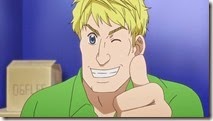 |
 |
 |
 |
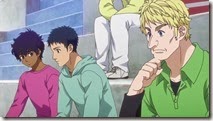 |
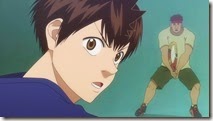 |
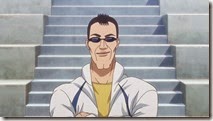 |
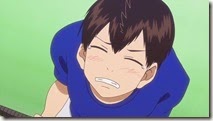 |
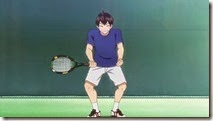 |


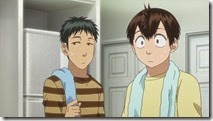
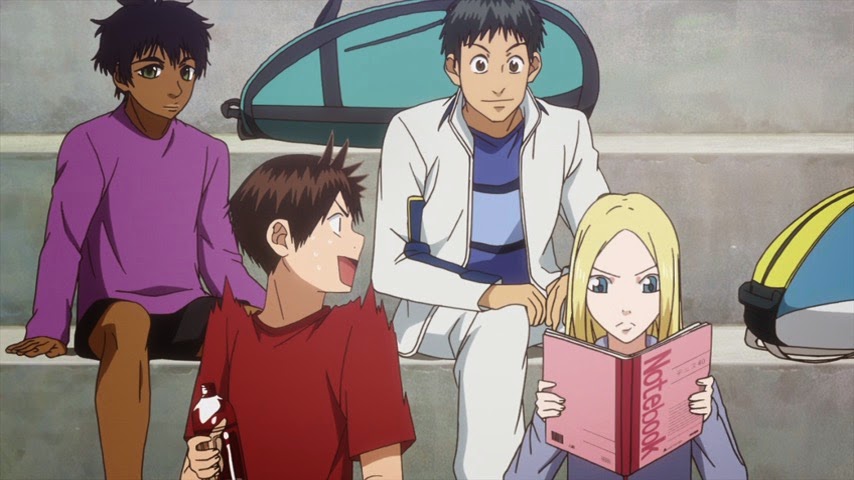

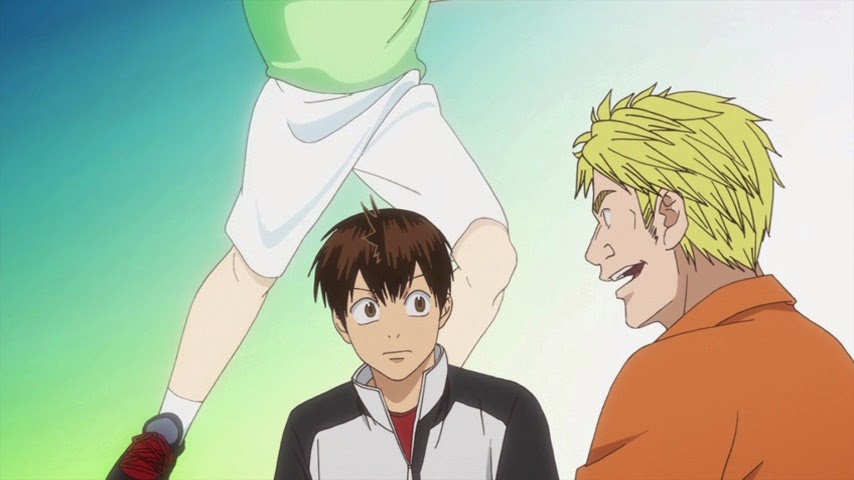
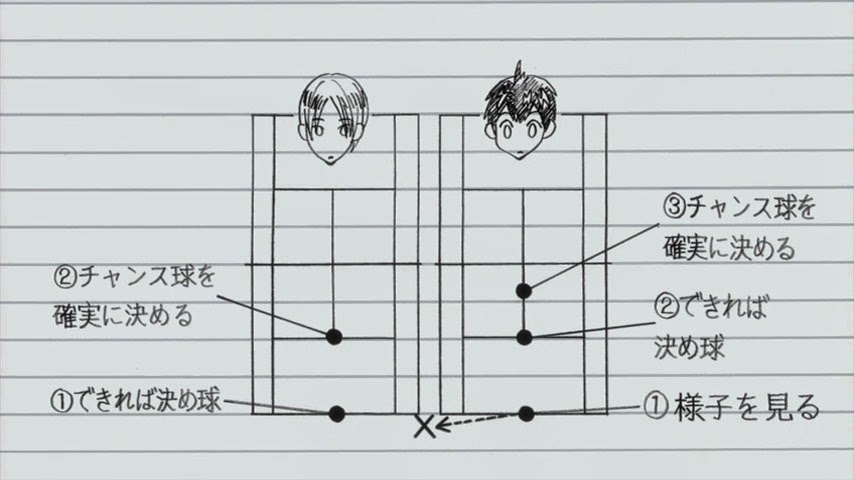
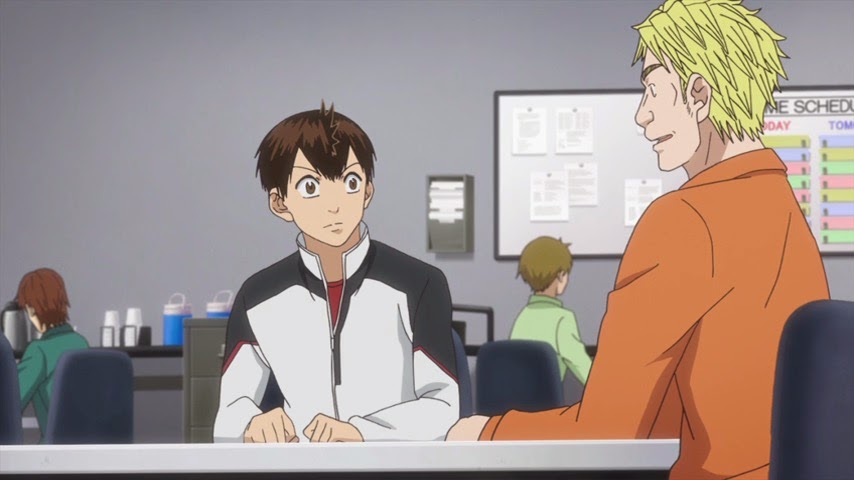
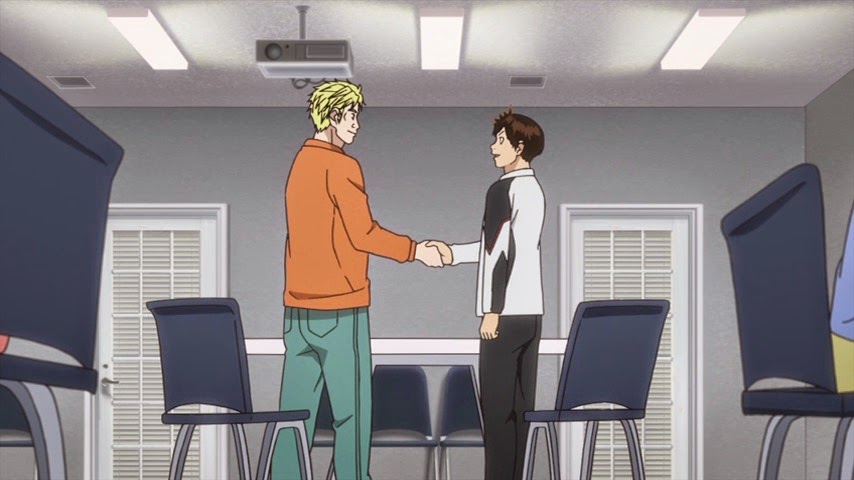
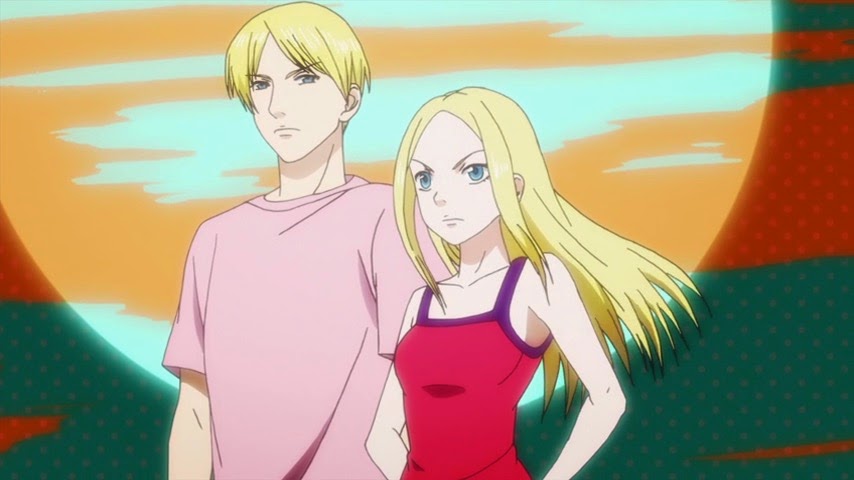


currycurry
April 12, 2015 at 7:04 pmDespite knowing it would happen, seeing the scene in which Eichiro cries out after winning for the first time in America was incredibly moving. Got a little teary eyed. ;;
Nadavu
April 12, 2015 at 8:48 pmHearing that 'beribin yoself' from Alex made me think that this is probably the least believable aspect of Baby Steps so far; It has been established already that Eiichiro can't really put an English sentence together (though I'm sure he gets nothing but straight A's on his English exams in school), but that doesn't seem to stop him from freely communicating with everyone in Florida.
BS has so far been incredibly faithful to the nitty-gritty of Eiichiro's quest, but here I feel a little cheated – a major obstacle (which must be a huge percentage of what makes the coveted America trip so scary to Japanese aspiring players) has been removed for the sake of unhindering plot development. I can't help but feel that a truly sublime writing would have taken the language barrier into account without making things too awkward.
Salce
April 12, 2015 at 9:00 pmI guess it wasn't possible to have english speaking seiyus for the anime so they went for the easy "suspending disbelief" path.
In the manga Eiichiro has trouble speaking with everyone in America an Atsushi helps a lot with translations.
Nadavu
April 12, 2015 at 9:30 pmSo the manga was straight up about it? That actually makes me feel much better about it 🙂
currycurry
April 12, 2015 at 11:19 pmWhat Salce said! After this arc is over (or perhaps the season is over), I recommend checking out this part again in the manga. The way the mangaka handles the language barrier was freaking delightful.
admin
April 13, 2015 at 12:38 amCan you name me an example of an anime that staged a multi-episode arc entirely in English for the sake of verisimilitude?
Nadavu
April 13, 2015 at 9:55 amI'm not saying that the seiyuu should have spoken English, only that the show should have acknowledged the fact that the characters were speaking a different language that Eiichiro wasn't able to understand very well. It's hardly unheard of to portray foreign languages while having all the dialog in the same language. The audience needs to able to understand what's being said, but that doesn't make the characters magically immune to miscommunication.
I read the relevant parts in the manga as per recommended, and indeed it was dealt with very well there. I guess the anime didn't want to address this issue because it would have slowed down the pacing, but… that's kinda contrary to what Baby Steps is all about, isn't it?
By the way, while reading the manga I came across Alex's mysterious comment about asians not understanding western etiquette. Turns out what he actually said was something like 'asian players don't understand the current meta of the game', which actually makes sense
Arnaldo
April 12, 2015 at 8:51 pmanime
giant killing= ping pong > capeta >>>>baby steps
manga
baby steps > holyland(?) >>>>>>>>>>>>> any manga
Jaypee Juanerio
April 13, 2015 at 1:57 amI just realize upon watching this really good episode that Hanae Natsuki does not have any range at all. While he was voicing Krishna, I could not put out the fact that this is INAHO and KANEKI speaking..Sheesh. In the other hand, Han-san is good always.